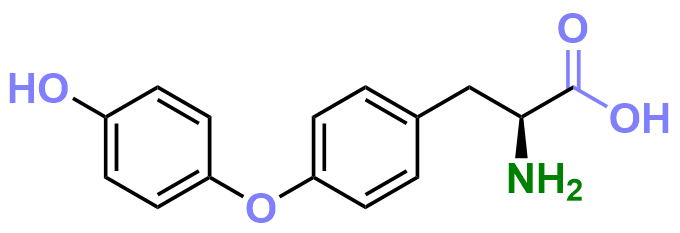L-Thyronine Analysis Service
- Identifying new disease biomarkers
- Enhancing disease diagnosis
- Accelerating the discovery of novel therapeutics
- Revealing new insights into disease mechanisms
- Animal tissue ≥ 100 mg
- Plant tissue ≥ 200 mg
- Serum/ Plasma ≥ 200 μL
- Urine ≥ 2 mL
L-Thyronine (L-Thyroxine) is a type of thyroid hormone and an amino acid derivative, structurally similar to L-tyrosine, formed through iodination. It is an important precursor in the synthesis of thyroid hormones, with a chemical formula of C15H15NO4 and a molecular weight of approximately 269.25 g/mol. Since L-thyronine is a key precursor of thyroid hormones, its levels directly reflect thyroid synthesis function and hormone levels in the body. Measuring L-thyronine levels can assess whether thyroid function is normal, making it an important indicator for diagnosing thyroid disorders. The metabolites of L-thyronine include active thyroid hormones such as T3 (triiodothyronine) and T4 (thyroxine). T3 is the active form of thyroid hormone, while T4 is the primary circulating form. Measuring L-thyronine and its metabolites helps evaluate the conversion efficiency of thyroid hormones in the body, aiding in the identification of metabolic abnormalities and adjustment of hormone therapy regimens.

Figure 1. The Structure of L-Thyronine
MtoZ Biolabs provides superior L-Thyronine Analysis Service, leveraging our cutting-edge liquid chromatography-mass spectrometry (LC-MS) platform and expert metabolomics team. Our service delivers comprehensive analysis of L-thyronine, evaluating thyroid function, metabolic status, and overall health, providing a scientific basis for personalized nutritional interventions and clinical treatments.
Analysis Workflow
Service Advantages
1. High Sensitivity and Accuracy
MtoZ Biolabs' liquid chromatography-mass spectrometry (LC-MS) analysis platform can detect extremely low concentrations of RA and its metabolites, which is particularly important for studying their minute changes in cells, tissues, and bodily fluids.
2. High Specificity
By optimizing chromatographic separation conditions and mass spectrometry detection parameters, RA and its various metabolites can be effectively distinguished in complex biological samples, minimizing interference from other endogenous or exogenous substances and improving detection specificity.
3. Customized Analysis
Tailored analytical solutions can be designed according to research needs, providing personalized solutions for different biological samples and target molecules.
Applications
Sample Submission Requirements
1. Sample Types
Serum, plasma, urine, tissues, and other biological samples. For each sample, it is necessary to select more than 3 materials under the same condition.
2. Sample Volume
3. Sample Preservation
Store at -80°C to maintain stability.
Note: Provide details on sample collection and handling.
Deliverables
1. Experimental Procedures
2. Relevant Liquid Chromatography and Mass Spectrometry Parameters
3. Detailed Information on L-Thyronine
4. Raw Data
5. Custom Analysis Report
Through our L-thyronine analysis service, we dedicate to fueling your research and product development processes by delivering accurate and reliable results. If you would like to inquire about our services, please feel free to contact us.
How to order?







